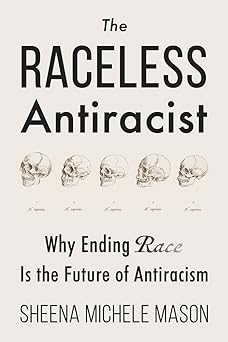
I was enticed into getting this book via Interlibrary Loan via the University Near Here by a thumbs-up review from Rachel Ferguson in Reason. And… even though I'm a big Reason fan, I feel I was misled.
The author, Sheena Michele Mason, is an assistant professor of English at SUNY Oneonta, and her writing style is "Woke Academic": overinflated, full of faux profundities and jargon. But it's worse than that. Her primary thesis is that the conventional concept of "race" is fictional and incoherent; hence, she avoids conventional English in discussing it, using her own invented terminology. And lots of scare quotes around words and terms of which she disapproves.
For example, nobody is "white" or "black". Instead, Mason describes them as "getting racialized" as white or black; emphasizing that it's something assigned to them by others. And when that happens, you are being "eraced". Why? Well, of course, there's only one possible reason: to maintain social, economic, class, and cultural power imbalances, cementing the white/black hierarchical structure! All for the benefit of the 1%!
The invented lingo also involves pointless punctuation and mutated spelling. "Racism" becomes "race/ism", "racist" becomes "racial/ist". And racial "eracesure".
A short chapter (co-written with biologist Tade Souaiaia) attempts to establish the unreality of race. I don't want to get into the scientific weeds on it, but I was left unconvinced. I kept visualizing Mason echoing the classic line uttered by Chico Marx to Margaret Dumont in Duck Soup: "Well, who you gonna believe? Me or your own eyes?" Sure, racial boundaries are fuzzy and, in many individual cases, arbitrary. But the thing about even fuzzy boundaries is that they bound something real. Don't get angry, but I think Charles Murray's book Human Diversity is pretty convincing on this score. And (I think) refusing to acknowledge that plays into the hands of actual bigots.
But (see the subtitle), Mason's overall argument advocates for "ending" race. So, colorblindness, right? I'm more than OK with that.
Wrong! Mason sees colorblindness as merely the other side of the coin of racial bigotry. With a considerable amount of handwaving, she asserts (over and over) that even acknowledging the mere existence of race (which colorblind advocates do) is tantamount to classifying Black folk as less-than.
This gets particularly offensive (but also ludicrous) when Mason briefly considers Martin Luther King's famous line: "I have a dream that my four little children will one day live in a nation where they will not be judged by the color of their skin, but by the content of their character." With more unconvincing handwaving (pp. 89-90), she "translates" MLK's words into—surprise—agreeing exactly with her own position.
There are some good things here. She debunks the well-meaning concern of an acquaintance that she is in danger from being shot by some cop at any time. She advocates that the Census Bureau adopt a checkbox for "No Race" on their form. (I guess this is similar to how some consider themselves "agender".)
Finally, she's selling something. Something called the "Togetherness Wayfinder", of which Mason is not the "inventor", but the "innovator". Backed up by workshops, speaking engagements, etc. There's a website.
![[The Blogger]](/ps/images/barred.jpg)



